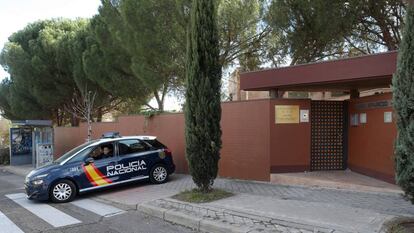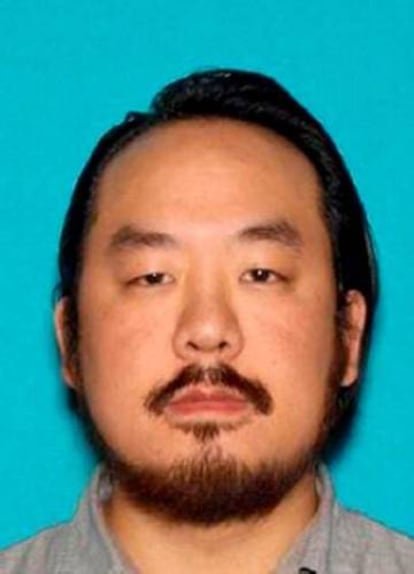Violent attack or peaceful meeting? The two versions of the North Korean embassy raid
Speaking to EL PAÍS, the lawyer of the alleged ringleader insists no violence was used at the Madrid diplomatic mission, and says testimony from Korean staff should not be trusted

The attack on the North Korean embassy in Madrid on February 22 continues to be shrouded in mystery. A man named Adrian Hong Chang has been identified as the alleged ringleader of the raid but his whereabouts are currently unknown.
In an interview with EL PAÍS, Hong’s lawyer, Lee Wolosky, from the Boies Schiller Flexner law firm, says his client has taken the necessary measures to keep himself “safe” after Spanish Judge José de la Mata issued an international warrant for his arrest. Speaking from his office in New York, Wolosky criticized Spanish authorities for publishing the names of the suspects, who belong to Free Joseon, a mysterious group that opposes the regime of North Korean leader Kim Jong-un. Wolosky argued the Spanish justice system has put the lives of the members at risk and insisted that the reports of violence from the North Korean staff cannot be trusted.

Wolosky, who offered no explanation as to how Hong became his client, is fighting to stop the dissident from being extradited to Spain, where he faces seven charges for his alleged involvement in the attack on the North Korean embassy in Madrid – including breaking and entering, unlawful detention, robbery with violence and falsification of documents.
“We know the North Korean regime has targeted Mr Hong and that this government routinely assassinates its political opponents, even those who are in third-party countries, so we believe he has taken reasonable steps to remain safe,” said Wolosky, a security expert who worked for many years with the US administration as a member of the National Security Council of the governments of Bill Clinton and George W. Bush, and later as Barack Obama’s Special Envoy for Guantanamo Closure.
According to the arrest warrant issued in California, US police saw Hong at his home in Los Angeles around April 9. Another member of the group, former US marine Christopher Ahn, was arrested a few days later in the same city.
The arrest warrant states that Adrian Hong arrived in Madrid on February 7 and appeared at the North Korean embassy as a businessman named Matthew Chao. He spoke with the commercial attaché at the embassy, identified in the warrant by the initials Y. S. S.
On February 22 at around 5pm, security cameras filmed Hong entering the embassy. According to Spanish High Court Judge José de la Mata, Hong took advantage of a moment of carelessness by embassy personnel to let his accomplices in. The group ran in with machetes, knives, lead bars and replica handguns, and “began violently hitting the occupants, until they were overpowered and immobilized with handcuffs and cable ties.”
We know the North Korean regime has targeted Mr Hong and that this government routinely assassinates its political opponents
Lee Wolosky, lawyer representing Adrian Hong
The group stole a pair of pen drives, two computers, two hard drives (one containing security images) and a cellphone, then allegedly fled in two diplomatic cars belonging to the embassy. Hong ordered an Uber under the name of Oswaldo Trump and was dropped off near Toledo, south of Madrid. The next day he flew to Newark airport and took another Uber to New York.
On February 27, Hong handed over the material the group had stolen to the Federal Bureau of Investigation (FBI). The FBI however, did not share this information with Spain until three weeks later. Spanish investigators believe the raid, which took place five days before the nuclear talks between Kim and US President Donald Trump in Vietnam, was aimed at finding sensitive information about the North Korean nuclear program. As part of the investigation, Spanish officers looked into possible links between the Central Intelligence Agency (CIA) and several members of Free Joseon, formerly known as Cheollima Civil Defense.
Hong’s lawyer, however, maintained he is not aware of any possible connection between the CIA and the raid, and insisted there is no evidence that the group used violence against embassy staff. “Mr Hong has a long history defending human rights and has maintained from the beginning that he was invited to the embassy,” said Wolosky, who added that “the images provided by the Spanish authorities corroborate this version, given that they show the members of Free Joseon casually entering the embassy.”
Testimony of diplomatic staff
“The current accusations are based only on the statements of the North Korean agents, who are not credible. Indeed, they have an incentive to lie about why they were talking for hours with an opposition group within the embassy,” said Wolosky.
Hong’s lawyer accused Spanish authorities of being “extremely naive” for basing their case on the “version of North Korean agents who fear for their lives.”
Free Joseon does not use violence, unlike the totalitarian Kim regime
Lee Wolosky, lawyer representing Adrian Hong
At the end of March, sources from the Spanish investigation said that they were able to recover some of the security camera footage before it was automatically deleted, which showed the attack was “extremely violent and professional.”
On February 27, Spanish police were alerted to the attack by the wife of a North Korean official, who injured herself jumping out of a window in the building to find help. But Wolosky argued that “nothing happened inside the embassy,” and that nothing was stolen.
According to Hong’s lawyer, Free Joseon “does not use violence, unlike the totalitarian Kim regime” and instead is committed to “rescuing people and helping deserters.”
What is Free Joseon?
Very little is known about Free Joseon. Jean H. Lee, who worked for five years as a delegate of the news agency AP in Pyongyang and is now the head of North Korean studies at the Wilson Center in Washington, explained that they appear to be a “group of activists led by people of Korean origin, perhaps American Koreans.”
According to Lee, in the past the group “claimed to have the support of foreign governments, specifically in the operation to save Kim Han Sol [the son of Kim Jong-un’s stepbrother Kim Jong-nam] after his father was assassinated in 2017 [in Kuala Lumpur airport],” but “their alleged guerrilla tactics in Madrid could have forced some governments to cut ties [with the group].”
Adrian Hong was relatively well known in the circle of activists fighting the regime of Kim Jong-un. He went to Yale University, founded the consultancy firm Pegasus Strategies and was the chief executive of Liberty in North Korea, an NGO that supports North Korean refugees. In recent years, he has written opinion pieces about the regime for well-known US publications such as The New York Times, Atlantic and Foreign Policy.
Hong, a US resident with a Mexican passport, is now a “fugitive” of the Spanish government.
English version by Melissa Kitson.
Tu suscripción se está usando en otro dispositivo
¿Quieres añadir otro usuario a tu suscripción?
Si continúas leyendo en este dispositivo, no se podrá leer en el otro.
FlechaTu suscripción se está usando en otro dispositivo y solo puedes acceder a EL PAÍS desde un dispositivo a la vez.
Si quieres compartir tu cuenta, cambia tu suscripción a la modalidad Premium, así podrás añadir otro usuario. Cada uno accederá con su propia cuenta de email, lo que os permitirá personalizar vuestra experiencia en EL PAÍS.
¿Tienes una suscripción de empresa? Accede aquí para contratar más cuentas.
En el caso de no saber quién está usando tu cuenta, te recomendamos cambiar tu contraseña aquí.
Si decides continuar compartiendo tu cuenta, este mensaje se mostrará en tu dispositivo y en el de la otra persona que está usando tu cuenta de forma indefinida, afectando a tu experiencia de lectura. Puedes consultar aquí los términos y condiciones de la suscripción digital.









































